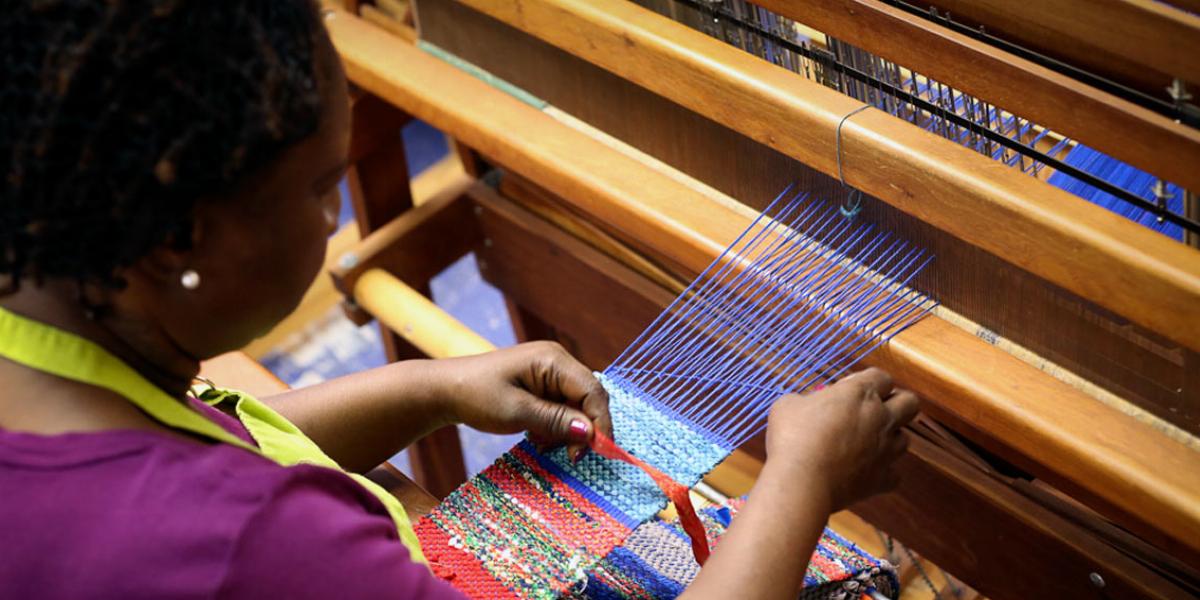
The bustling city of Atlanta is home to a nonprofit that is changing the very fabric of the community.
Homelessness is a problem across the country, and Lisa Wise is more familiar with it than most through her work at Atlanta’s Initiative for Affordable Housing. Breaking the cycle of poverty is difficult without job training and support for developing soft skills, but after intense market research she had an idea.
“When we thought about re:loom, before it had a name, it was really all about providing jobs and job training for the women who were in our homeless program. We learned that handmade goods were becoming more important to consumers, and that there was an awareness of how many textiles were being sent to the landfill. So we combined helping people with upcycling to empower women, and re:loom was born.”
Lisa Wise | Executive Director, re:loom
Every weaver at re:loom was homeless or at-risk of becoming homeless before entering the program. While training and working at the organization, they receive full-time wages and benefits to help stabilize their living situations and prepare them to take the next step in their careers.
Wise describes the nonprofit as a job training program, but while most companies hire employees intending to keep them, her goal is to help re:loom employees move on to other opportunities. “Many people who come to us have never had a job before,” Wise explains. “We are teaching them soft skills that every employer wants.”
Re:loom depends on the help of volunteers to assist with the day-to-day operations of the business, such as preparing any donated clothing and fabric for the weavers. For example, when a t-shirt is donated, they cut the sleeves off and shred the fabric into strips. The strips are then rolled into what is called a “weft” ball. These are kept in bins that the weavers sort through when planning a new project.
Colored fabric, chosen by re:loom workers, is first “warped” onto the loom. This is the process of stretching fabric from the weft ball onto the frame of the loom which provides the base for weaving. Then they use a shuttle to intricately weave long strands from the weft ball through the loom to create everything from rugs to messenger bags. Any material that cannot be rolled into a weft, including buttons, Velcro and zippers, are saved to be used on a finished weaving project like a messenger bag or keychain.
Re :loom takes in a large amount of fabric to upcycle into all kinds of products. Wise estimates that her workers see about one ton of fabric each month, and all of it is put to good use. For example, re:loom needs to process between 25 to 30 t-shirts to make a single 3 x 5 foot rug. “The fabric is weaved in tightly,” Wise says. “It takes a lot to create a rug.”
And the end result is striking. What was once a pile of unwanted or discarded material is transformed into a beautiful, high-quality product. Rugs are some of their best sellers, and it’s easy to see why.
“They are making a product that is beautiful and is something that people want to buy. This is very powerful for their self-esteem. When a customer purchases a rug and brings it back into their home to cherish, it’s important for our employees to see and hear that.”
Lisa Wise |Executive Director, re:loom
Diverted materials fill their weave house, where residents and businesses donate clean clothes, linen, curtains, uniforms and textiles to upcycle. Re:loom currently doesn’t have the capacity to clean the clothing or fabric that comes in, and Wise recommends calling ahead to see if they have room to take in anything new.
To date, 28 individuals have completed the program, and re:loom currently has four full-time weavers and a manager on the worksite. A large driver of their growth is a corporate partnership plan that also doubles as a buy-back program.
“Corporate partners give us uniforms that they cannot give away because they are branded. We have a relationship with Delta where we use their uniforms and they buy the finished product back from us.”
Lisa Wise | re:loom
The organization also worked on a project with MailChimp. Employees created an abstract area rug from donated company t-shirts, and even got a helping hand from a few members of the MailChimp team. Check out this video to get a unique inside look at the weave house and process.
Ongoing partnerships and donations provide opportunities for re:loom to continue upcycling clothing and transforming the lives of at-risk members of the community. While the staff at re:loom teaches employees the art of weaving and loom work, what they are really doing is even more important. “We’re teaching them self-confidence,” Wise says, “and that’s extremely powerful.”
This is part of a Dumpsters.com series highlighting sustainable organizations working to revitalize their communities. If you are in the Atlanta area, learn how you can help support re:loom’s mission with a donation.
